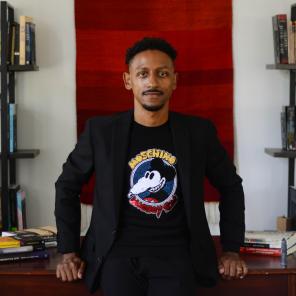October 4, Power & Inequality Working Group Speaker Series, Reparative Media: How To Heal Our Culture

Reparative Media: How To Heal Our Culture
11 a.m. for Presentation
Registration Link: https://rutgers.zoom.us/webinar/register/WN_kjsv-sHhSCKo2Bsm4K8PPQ
1 p.m. for Workshop
Registration Link: https://rutgers.zoom.us/meeting/register/tJwude6spjMpH91aptej6vPS7ca66RaV-VGW
Bio:
Aymar Jean "AJ" Christian is an associate professor of communication studies at Northwestern University, director of the Media And Data Equity (MADE) Lab and co-founder of the community-run digital platform OTV | Open Television. He published his first book, Open TV: Innovation Beyond Hollywood and the Rise of Web Television, on New York University Press in 2018, and is currently writing his second book, Reparative Media: How to Heal our Culture, which explores how to repair systemic harm and discrimination in media, technology and research. His work has been recognized by the MacArthur Foundation & Field Foundation (Leaders for a New Chicago, 2019), Variety (Top 50 Entertainment Instructor 2020 & 2021), Filmmaker (25 New Faces of Indie Film, 2018) NewCity (Film Leader 2017 & Film Hall of Fame 2020), Chicago magazine (New Power List, 2021) and Seed&Spark (Filmmaker to Watch 2018).
Abstract:
Reparative Media argues we can create a healing cultural system by developing media, technology and research in communities and informed by intersectionality. I base my argument on five years of deep, productive, and complex work creating an independent alternative to networked media platforms like Netflix: a Chicago-based channel called OTV | Open Television developed in solidarity with Black and Brown queer, trans and women-identified artists—professional cultural healers. I use OTV as a case study for broader systemic changes that are clear and concrete, if only we can commit as much to repairing systems as we do ourselves. Like all processes for healing great wounds, reparative research & development (R&D) is not simple, easy or perfect, but its effects are immediate and backed by data. Reparative Media takes us from Black activist spaces on Chicago’s segregated South Side to the Emmys in Hollywood and tech campuses in New York, revealing how the small, local and intersectional has tremendous reparative power in the global, digital age.
Reparative Media: How To Heal Our Culture
11 a.m. for Presentation
Registration Link: https://rutgers.zoom.us/webinar/register/WN_kjsv-sHhSCKo2Bsm4K8PPQ
1 p.m. for Workshop
Registration Link: https://rutgers.zoom.us/meeting/register/tJwude6spjMpH91aptej6vPS7ca66RaV-VGW
Bio:
Aymar Jean "AJ" Christian is an associate professor of communication studies at Northwestern University, director of the Media And Data Equity (MADE) Lab and co-founder of the community-run digital platform OTV | Open Television. He published his first book, Open TV: Innovation Beyond Hollywood and the Rise of Web Television, on New York University Press in 2018, and is currently writing his second book, Reparative Media: How to Heal our Culture, which explores how to repair systemic harm and discrimination in media, technology and research. His work has been recognized by the MacArthur Foundation & Field Foundation (Leaders for a New Chicago, 2019), Variety (Top 50 Entertainment Instructor 2020 & 2021), Filmmaker (25 New Faces of Indie Film, 2018) NewCity (Film Leader 2017 & Film Hall of Fame 2020), Chicago magazine (New Power List, 2021) and Seed&Spark (Filmmaker to Watch 2018).
Abstract:
Reparative Media argues we can create a healing cultural system by developing media, technology and research in communities and informed by intersectionality. I base my argument on five years of deep, productive, and complex work creating an independent alternative to networked media platforms like Netflix: a Chicago-based channel called OTV | Open Television developed in solidarity with Black and Brown queer, trans and women-identified artists—professional cultural healers. I use OTV as a case study for broader systemic changes that are clear and concrete, if only we can commit as much to repairing systems as we do ourselves. Like all processes for healing great wounds, reparative research & development (R&D) is not simple, easy or perfect, but its effects are immediate and backed by data. Reparative Media takes us from Black activist spaces on Chicago’s segregated South Side to the Emmys in Hollywood and tech campuses in New York, revealing how the small, local and intersectional has tremendous reparative power in the global, digital age.
